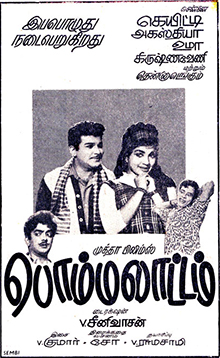Bommalattam (1968 film)
| Bommalattam | |
|---|---|
 Poster | |
| Directed by | Muktha Srinivasan |
| Screenplay by | Cho Ramaswamy |
| Story by | Madurai Thirumaran |
| Produced by | V. Ramasamy |
| Starring | Jaishankar Jayalalithaa |
| Cinematography | T. M. Sundarababu B. A. |
| Edited by | L. Balu |
| Music by | V. Kumar |
Production company | Muktha Films[1] |
Release date |
|
Running time | 165 minutes[1] |
| Country | India |
| Language | Tamil |
Bommalattam (transl. Puppet Show) is 1968 Indian Tamil-language comedy film, directed by Muktha Srinivasan and produced by V. Ramasamy.[2] The script was written by Cho Ramaswamy. Music was by V. Kumar. It stars Jaishankar, Jayalalithaa, Nagesh, Major Sundarrajan, Cho Ramaswamy and Manorama. V. S. Raghavan, Sachu and O. A. K. Thevar play key roles. The film was released on 31 May 1968.[3]
Plot[]
This article needs a plot summary. (August 2021) |
Cast[]
- Jaishankar as Sukumar
- Jayalalithaa as Malathy
- Nagesh as Durai
- Manorama as Chinna Ponnu
- Cho Ramaswamy as Jambajar Jakku
- Sachu as Geetha
- Venniradai Moorthy as Sukumar's father
- Major Sundarrajan as Rathnam/Bal Raj
- V. S. Raghavan as Dr. Dhamodharan
- O. A. K. Thevar as Chithambaram
- K. K. Soundar as Rathnam's henchman
Soundtrack[]
Music was composed by V. Kumar and lyrics were written by Vaali, Alangudi Somu, Na. Pandurangan and Avinasi Mani.[4] For the song "Vaa Vathiyare", Srinivasan wanted the usage of Madras Bashai, but Vaali felt it was hard for him, so M. L. Govind was hired to "provide the apt words to go with it", leading to the birth of lines in the song like "Jambaar Jakku, Na Saidapetta Kokku".[5] That also became Tamil cinema's first gaana song.[6] "Vaa Vathiyare", sung by Manorama became popular, and in 1991 HMV released a compilation album under the same title, featuring songs sung by Manorama.[7]
| No. | Song | Singer(s) | Length |
|---|---|---|---|
| 1 | "Mayakkathai" | P. Susheela | 3:55 |
| 2 | "Nee Aada Aada Azhagu" | T. M. Soundararajan | 3:20 |
| 3 | "Nalla Naal Parkkavo" | T. M. Soundararajan, P. Susheela | 4:11 |
| 4 | "Va Vathyare" (Jambajar Jakku) | Manorama | 3:51 |
| 5 | "Poonai Kannai Kattinal" | Tharapuram Sundararajan & S. Sarala | 3:10 |
References[]
- ^ a b Cowie, Peter (1977). World Filmography. Tantivy Press. p. 266.
- ^ https://kalkionline.com/imagegallery/archiveimages/kalki/1968/jun/23-06-1968/p41.jpg
- ^ "Bommalattam (1968)". Screen4screen. Retrieved 18 September 2021.
- ^ "Bommalaattam". Gaana.com. Retrieved 18 September 2021.
- ^ Ramanujam, Srinivasa (28 August 2016). "The vathyaar dialect". The Hindu. Retrieved 31 October 2017.
- ^ Vijayakumar, Sindhu (15 May 2017). "Gana is the voice and language of people who are outcasts". The Times of India. Retrieved 20 May 2019.
- ^ Pradeep, K. (30 June 2008). "50 years of Manorama". The Hindu. Retrieved 8 August 2021.
External links[]
- Bommalattam at IMDb
- 1968 films
- Tamil-language films
- 1960s Tamil-language films
- 1968 comedy films
- Films directed by Muktha Srinivasan
- Indian black-and-white films
- Indian comedy films
- Indian films